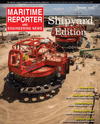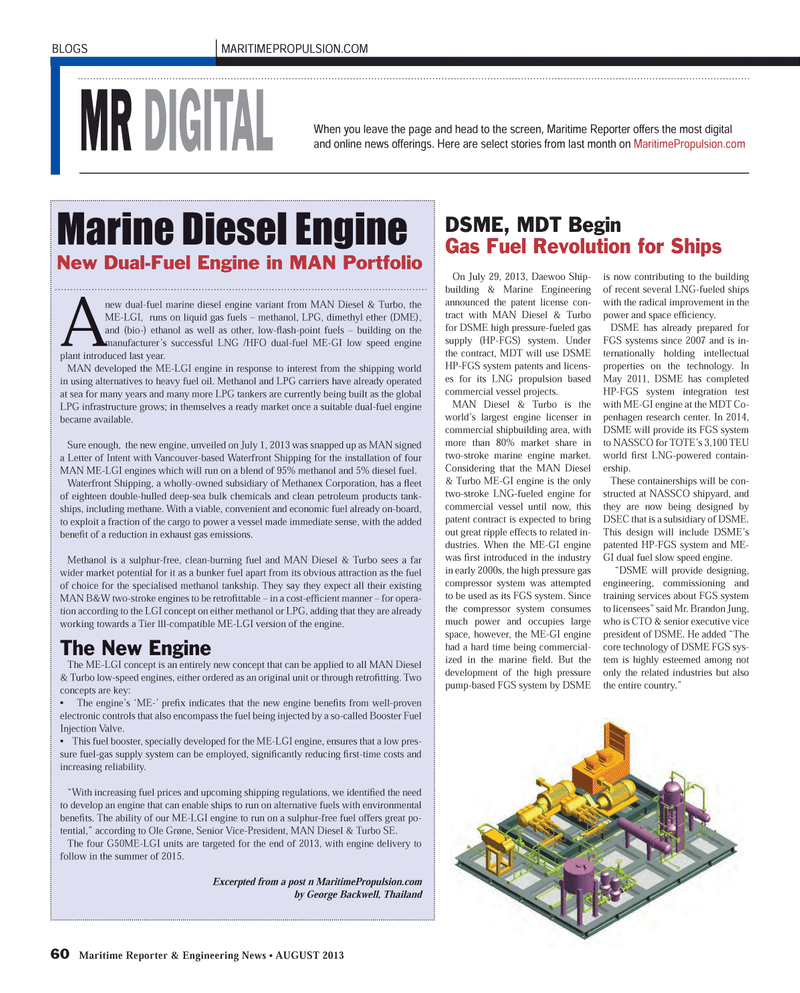
Page 60: of Maritime Reporter Magazine (August 2013)
Shipyard Edition
Read this page in Pdf, Flash or Html5 edition of August 2013 Maritime Reporter Magazine
60 Maritime Reporter & Engineering News ? AUGUST 2013 BLOGSMARITIMEPROPULSION.COMMR DIGITAL When you leave the page and head to the screen, Maritime Reporter offers the most digital and online news offerings. Here are select stories from last month on MaritimePropulsion.comMarine Diesel EngineNew Dual-Fuel Engine in MAN PortfolioA new dual-fuel marine diesel engine variant from MAN Diesel & Turbo, the ME-LGI, runs on liquid gas fuels ? methanol, LPG, dimethyl ether (DME), and (bio-) ethanol as well as other, low- ß ash-point fuels ? building on the manufacturer?s successful LNG /HFO dual-fuel ME-GI low speed engine plant introduced last year. MAN developed the ME-LGI engine in response to interest from the shipping world in using alternatives to heavy fuel oil. Methanol and LPG carriers have already operated at sea for many years and many more LPG tankers are currently being built as the global LPG infrastructure grows; in themselves a ready market once a suitable dual-fuel engine became available.Sure enough, the new engine, unveiled on July 1, 2013 was snapped up as MAN signed a Letter of Intent with Vancouver-based Waterfront Shipping for the installation of four MAN ME-LGI engines which will run on a blend of 95% methanol and 5% diesel fuel.Waterfront Shipping, a wholly-owned subsidiary of Methanex Corporation, has a ß eet of eighteen double-hulled deep-sea bulk chemicals and clean petroleum products tank-ships, including methane. With a viable, convenient and economic fuel already on-board, to exploit a fraction of the cargo to power a vessel made immediate sense, with the added beneÞ t of a reduction in exhaust gas emissions. Methanol is a sulphur-free, clean-burning fuel and MAN Diesel & Turbo sees a far wider market potential for it as a bunker fuel apart from its obvious attraction as the fuel of choice for the specialised methanol tankship. They say they expect all their existing MAN B&W two-stroke engines to be retro Þ ttable ? in a cost-ef Þ cient manner ? for opera- tion according to the LGI concept on either methanol or LPG, adding that they are already working towards a Tier lll-compatible ME-LGI version of the engine. The New EngineThe ME-LGI concept is an entirely new concept that can be applied to all MAN Diesel & Turbo low-speed engines, either ordered as an original unit or through retro Þ tting. Two concepts are key:? The engine?s ?ME-? pre Þ x indicates that the new engine bene Þ ts from well-proven electronic controls that also encompass the fuel being injected by a so-called Booster Fuel Injection Valve. ? This fuel booster, specially developed for the ME-LGI engine, ensures that a low pres- sure fuel-gas supply system can be employed, signiÞ cantly reducing Þ rst-time costs and increasing reliability. ?With increasing fuel prices and upcoming shipping regulations, we identi Þ ed the need to develop an engine that can enable ships to run on alternative fuels with environmental beneÞ ts. The ability of our ME-LGI engine to run on a sulphur-free fuel offers great po- tential,? according to Ole Grøne, Senior Vice-President, MAN Diesel & Turbo SE. The four G50ME-LGI units are targeted for the end of 2013, with engine delivery to follow in the summer of 2015.Excerpted from a post n MaritimePropulsion.com by George Backwell, ThailandOn July 29, 2013, Daewoo Ship-building & Marine Engineering announced the patent license con-tract with MAN Diesel & Turbo for DSME high pressure-fueled gas supply (HP-FGS) system. Under the contract, MDT will use DSME HP-FGS system patents and licens-es for its LNG propulsion based commercial vessel projects. MAN Diesel & Turbo is the world?s largest engine licenser in commercial shipbuilding area, with more than 80% market share in two-stroke marine engine market. Considering that the MAN Diesel & Turbo ME-GI engine is the only two-stroke LNG-fueled engine for commercial vessel until now, this patent contract is expected to bring out great ripple effects to related in- dustries. When the ME-GI engine was Þ rst introduced in the industry in early 2000s, the high pressure gas compressor system was attempted to be used as its FGS system. Since the compressor system consumes much power and occupies large space, however, the ME-GI engine had a hard time being commercial-ized in the marine Þ eld. But the development of the high pressure pump-based FGS system by DSME is now contributing to the building of recent several LNG-fueled ships with the radical improvement in the power and space efÞ ciency. DSME has already prepared for FGS systems since 2007 and is in-ternationally holding intellectual properties on the technology. In May 2011, DSME has completed HP-FGS system integration test with ME-GI engine at the MDT Co- penhagen research center. In 2014, DSME will provide its FGS system to NASSCO for TOTE?s 3,100 TEU world Þ rst LNG-powered contain- ership. These containerships will be con-structed at NASSCO shipyard, and they are now being designed by DSEC that is a subsidiary of DSME. This design will include DSME?s patented HP-FGS system and ME-GI dual fuel slow speed engine. ?DSME will provide designing, engineering, commissioning and training services about FGS system to licensees? said Mr. Brandon Jung, who is CTO & senior executive vice president of DSME. He added ?The core technology of DSME FGS sys-tem is highly esteemed among not only the related industries but also the entire country.? DSME, MDT Begin Gas Fuel Revolution for ShipsMR #8 (58-65).indd 60MR #8 (58-65).indd 608/1/2013 2:49:06 PM8/1/2013 2:49:06 PM

 59
59

 61
61
